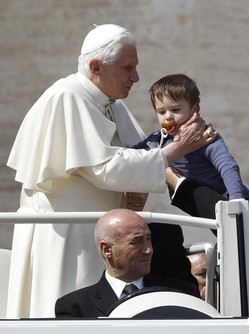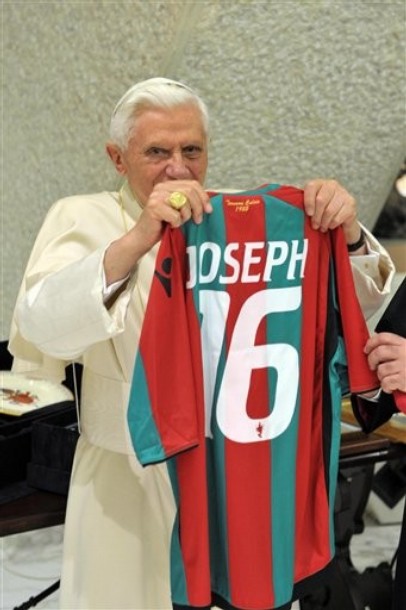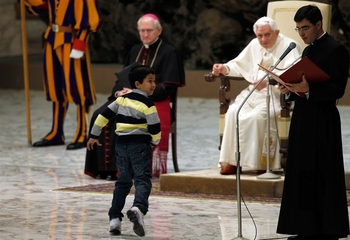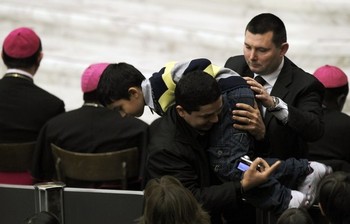Category: Pope Benedict XVI
Pope Benedict XVI’s monthly prayer intentions for April 2011
Prayer is
consenting to unite our desire to God’s passion for our salvation. And, that’s what we’ll do…
The general
intention
That through its compelling preaching of the Gospel, the Church may
give young people new reasons for life and hope.
The missionary intention
That
by proclamation of the Gospel and the witness of their lives, missionaries may
bring Christ to those who do not yet know him.
Pope’s team shirt
Court of the Gentiles –Le Parvis des Gentils à Paris: a call to fraternity to believers and nonbelievers to live coherent in Christ, and for a new humanity
 Cardinal Gianfranco Ravasi’s interview on the importance of the Court of the Gentiles for us. This is probably the single most significant initiative of the Pontifical Council for Culture taking seriously the place of belief and unbelief. The Pope some time ago asked the pastors of the Church to take atheism as a serious matter to engage in. And by atheism he’s not suggesting the Christopher Hitchens’ version of atheism but what might be called “honest atheism,” those who ask sincere questions of belief and who are seeking to live a coherent life. The Pope is brilliant in his call to respect, dialogue and living.
Cardinal Gianfranco Ravasi’s interview on the importance of the Court of the Gentiles for us. This is probably the single most significant initiative of the Pontifical Council for Culture taking seriously the place of belief and unbelief. The Pope some time ago asked the pastors of the Church to take atheism as a serious matter to engage in. And by atheism he’s not suggesting the Christopher Hitchens’ version of atheism but what might be called “honest atheism,” those who ask sincere questions of belief and who are seeking to live a coherent life. The Pope is brilliant in his call to respect, dialogue and living.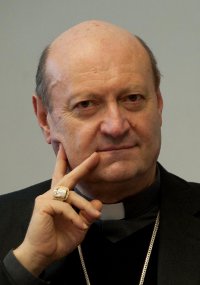 I know that at the invitation of Cardinal André Vingt-Trois, the Archbishop of Paris, and of Cardinal Gianfranco Ravasi (seen right), the President of the Pontifical Council for Culture, you are gathered in great numbers in front of the Cathedral of Notre Dame in Paris. I greet all of you, together with our brothers and friends from the Taizé Community. I am grateful to the Pontifical Council for having taken up and extended my invitation to open a number of “Courts of the Gentiles” within the Church. This image refers to the vast open space near the Temple of Jerusalem where all those who did not share the faith of Israel could approach the Temple and ask questions about religion. There they could meet the scribes, speak of faith and even pray to the unknown God. The Court was then an area of separation, since Gentiles did not have the right to enter the consecrated area, yet Jesus Christ came to “break down the dividing wall” between Jews and Gentiles, and to “reconcile both to God in one body through the cross, thus putting to death that hostility in himself”. In the words of Saint Paul, “He came and proclaimed peace…” (cf. Eph 2:14-17).
I know that at the invitation of Cardinal André Vingt-Trois, the Archbishop of Paris, and of Cardinal Gianfranco Ravasi (seen right), the President of the Pontifical Council for Culture, you are gathered in great numbers in front of the Cathedral of Notre Dame in Paris. I greet all of you, together with our brothers and friends from the Taizé Community. I am grateful to the Pontifical Council for having taken up and extended my invitation to open a number of “Courts of the Gentiles” within the Church. This image refers to the vast open space near the Temple of Jerusalem where all those who did not share the faith of Israel could approach the Temple and ask questions about religion. There they could meet the scribes, speak of faith and even pray to the unknown God. The Court was then an area of separation, since Gentiles did not have the right to enter the consecrated area, yet Jesus Christ came to “break down the dividing wall” between Jews and Gentiles, and to “reconcile both to God in one body through the cross, thus putting to death that hostility in himself”. In the words of Saint Paul, “He came and proclaimed peace…” (cf. Eph 2:14-17).
Pope Benedict a NY Times international bestseller
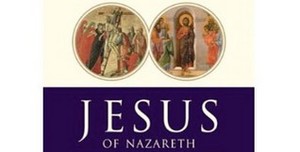 Pope Benedict’s book, Jesus of Nazareth, volume 2, internationally released on March 10 with 1.2 million copies in 8 languages.
Pope Benedict’s book, Jesus of Nazareth, volume 2, internationally released on March 10 with 1.2 million copies in 8 languages.
Pope Benedict XVI’s monthly prayer intentions for March 2011
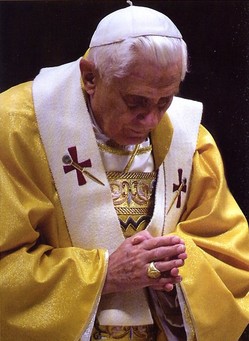 The Pope reminds us to broaden our awareness of other Christians in the world. Here we remember those Christians in Latin America and persecuted Christians. The second intention is most poignant given recent acts of violence on the many of the Eastern Churches.
The Pope reminds us to broaden our awareness of other Christians in the world. Here we remember those Christians in Latin America and persecuted Christians. The second intention is most poignant given recent acts of violence on the many of the Eastern Churches.The general intention
to the Gospel and progress in justice and peace.
light and strength to those in many regions of the world who are persecuted and
discriminated against because of the gospel.
In Christ’s wounds we are healed: World Day of the Sick and Our Lady of Lourdes
Many in the world suffer. That is a given and we ought to keep the suffering of others in the forefront of our minds. I think this is appropriate for no other reason than the example of Jesus who showed had compassion on all suffering people, healing them in body, mind, and soul. He even allowed Himself to be conquered by evil and suffering, though we know that He ultimately defeated death by death itself when on the third day he rose from the dead. Jesus’ own suffering and rising is proof of a love that knows know limits. As Benedict has said in various places that “Only a God who loves us to the extent of taking upon himself our wounds and our pain, especially innocent suffering, is worthy of faith.”
Continue reading In Christ’s wounds we are healed: World Day of the Sick and Our Lady of Lourdes
Vocations: “…everyone will know that you are my disciples…”
Released earlier today, the Pope gave the Church his thinking and hopes for the living and the promotion of vocations. Very clear is the Pope’s insistence on one’s being familiar with the Scriptures, friendship with the Lord cultivated through personal and liturgical prayer. Also, one’s own self-awareness factors into the discernment of one’s vocation, whether to religious life, priesthood or to the lay state. May the Lord of the Harvest grant an increase.
The 48th World
Day of Prayer for Vocations, to be celebrated on 15 May 2011, the Fourth Sunday
of Easter, invites us to reflect on the theme: “Proposing Vocations in the
Local Church”. Seventy years ago, Venerable Pius XII established the Pontifical
Work of Priestly Vocations. Similar bodies, led by priests and members of the
lay faithful, were subsequently established by Bishops in many dioceses as a
response to the call of the Good Shepherd who, “when he saw the crowds,
had compassion on them, because they were like sheep without a shepherd”,
and went on to say: “The harvest is plentiful but the labourers are few.
Pray therefore the Lord of the harvest to send out labourers into his
harvest!” (Mt 9:36-38).
Continue reading Vocations: “…everyone will know that you are my disciples…”
Pope no longer organ donor
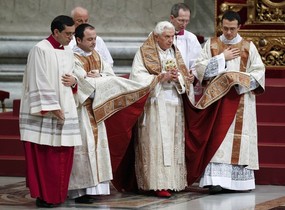 Word’s been received that Pope Benedict’s organ donor card is void. It’s been so since his election to the papacy in 2005. Since the 1970’s it is said that he’s been an organ donor.
Word’s been received that Pope Benedict’s organ donor card is void. It’s been so since his election to the papacy in 2005. Since the 1970’s it is said that he’s been an organ donor.
The act of love, which is expressed with the gift of one’s own vital organs, is a genuine testament of charity that knows how to look beyond death so that life always wins. The recipient should be aware of the value of this gesture that one receives, of a gift that goes beyond the therapeutic benefit. What they receive is a testament of love, and it should give rise to a response equally generous, and in this way grows the culture of gift and gratitude.


